#bush and renz
Text
(短評)映画『アンテベラム』

(引用元)
『アンテベラム』(2020年、米)
南北戦争時代、プランテーションで働かされる奴隷女性の受難を描く・・・と思ってたら、あれ現代⁉️
人種差別を扱った社会派要素以前にスリラー映画として👌
かなり無茶苦茶な仕掛けですが、戦場を過去から現在へ駆け抜ける映像のカタルシスからの真相が分かるラストの切れ味よ🐎
冒頭、台詞は無くとも一体今いつの時代でここはどこで、何が起こってるのかが立体的かつ一気に分かるワンカット、ここで既に💯ですよ‼️
わざとらしく見せたり、さりげなく見せたり、小出しにポイントとなる情報が映像中に見え隠れするし、面白いカットも多くて映像としても目が離せなかったです👌
奴隷として酷い仕打ちを受ける人々の痛々しい様子は、南部を舞台とした映画でこれまでも描かれてきているし「ああ悲しいな」と観ていたら、いきなり現代パートに移るのでちょっと驚かされました💦
現代と過去でそれぞれ不穏な出来事が起こり、次第に繋がり始めるアクロバティックな展開は面白い‼️
タランティーノの『ジャンゴ』みたいな展開を少し期待してたのですが、それどころじゃない予想の斜め上を行く展開が待っていて驚きました‼️
本作のように単に負の歴史を描いたり社会派なだけじゃ無く、無茶でも度肝を抜いてきたり、しっかりエンタメ性を備えた作品が好きです👍
⇒予告編
⇒Amazon
#antebellum#映画#映画レビュー#movie#movie review#ジェラルド・ブッシュ#gerard bush#クリストファー・レンツ#christopher renz#ジャネール・モネイ#janelle monae#エリック・ラング#eric lange#ジェナ・マローン#jena malone
1 note
·
View note
Text
If it chooses you, nothing can save you.
0 notes
Link

#movies#thriller#drama#mystery#amazon prime video#yann gozlan#michael pearce#gerard bush#christopher renz#david marmor#alejandro landes
0 notes
Text
Antebellum
Benvenuti o bentornati sul nostro blog. Nello scorso articolo siamo rimasti in Europa e abbiamo parlato di un film danese davvero interessante, ossia Valhalla Rising. La storia parla di One-Eye, un pericoloso guerriero che, dopo essere rimasto prigioniero per diverso tempo, riesce a liberarsi e a viaggiare insieme a un ragazzo. I due incontrano dei vichinghi cristiani che vogliono andare in Terra…
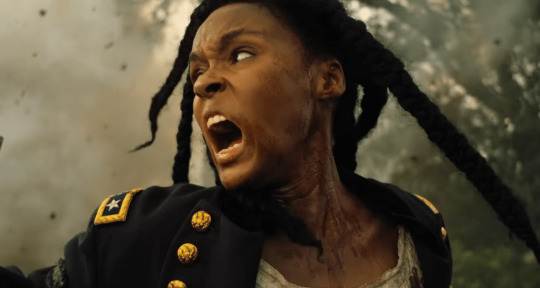
View On WordPress
#Antebellum#Christopher Renz#discriminazione#Eagle Pictures#Eric Lange#film#Gabourey Sidibe#Gerard Bush#Jack Huston#Janelle Monáe#Jena Malone#Kiersey Clemons#Lionsgate Films#London Boyce#Marque Richardson#Mary Zophres#movies#Nate Wonder#razzismo#Recensione#Recensione film#Roman Gianarthur#Tongayi Chirisa#Veronica Henley
0 notes
Text
ANTEBELLUM
Christopher Renz e Gerard Bush, 2020, per una pellicola atipica: ANTEBELLUM
ANNO
2020
GENERE
🤡PSYCO
DURATA
1:46′
REGISTA
CHRISTOPHER RENZ
GERARD BUSH
TRAMA
Veronica Henley, scrittrice di successo, è di ritorno dal tour promozionale del suo ultimo libro quando si ritrova ad affrontare una terribile realtà…
ANDIAMO AI VOTI
👏🏻FAMA: ⭐6/10🌟
🎬 TRAMA: ⭐7.2/10🌟
💰QUALITY: ⭐7/10🌟
🎭TENSIONE:…

View On WordPress
0 notes
Text
0 notes
Text
AfAmer112A#6
Jordan Peele’s film, Get Out, has had a significant impact on the trajectory of other marginalized horror films in several ways. Firstly, Get Out has demonstrated that horror films that focus on social and political issues that affect marginalized communities can be critically acclaimed and commercially successful. Peele implemented this unique combination of horror and social commentary that made it incredibly intriguing and resonated with thousands of people. The film ended up becoming a cultural phenomenon, as it made over 255 million dollars globally, and won multiple awards, including the Academy Award for Best Original Screenplay.
The success of Peele’s Get Out has genuinely paved the way for other marginalized horror films as it shows how this genre of films can significantly impact and attract audiences, deeming it profitable and successful in more ways than one. Additionally, it proves that there is an audience that appreciates marginalized horror and can relate to the content of the films. Secondly, Get Out has broken barriers for many filmmakers who seek to create films for marginalized communities to share their stories and shed light on the unjust social and political issues they face on a larger platform for audiences worldwide to see. As a black filmmaker, the success of Get Out helped pave the way for other Black directors, actors, and writers to step into Hollywood and get to star or create horror films of their own or even other films that they otherwise may not have felt would have the capability to succeed. There have been many other films, such as Cristopher Renz’s and Gerard Bush’s “Antebellum,” that have been released since and have been directed by and starred Black creators, experiencing much success at the box office. Finally, Get Out has sparked a much larger and more important conversation that is absolutely necessary regarding the representation of marginalized communities in horror films. The film sheds light on the twisted ways that horror films have historically relied on harmful stereotypes and tropes to represent marginalized groups, especially Black communities. By overturning these tropes, Get Out has challenged the genre of marginalized horror films, opening the doors and leaving room for other creative visionaries and legendary, or underrated filmmakers to create films that challenge and overthrow these harmful representations.
Ultimately, Get Out has significantly impacted the trajectory of other marginalized and Black horror films as it demonstrates their commercial potential, relatability, ability to break down barriers for marginalized visionaries, and spark up the more prominent, necessary conversation about minority representation within the genre, and shed light on the unjust social and political issues that minorities experience. Although the current state of Black horror is quite successful and popular, unfortunately, things have the ability to return to the way they were, which I hope does not happen. I, along with many others, am optimistic for the future and look forward to watching many more sensational marginalized horror films that give voice to those silenced in the past, especially the people of color, and illuminate the truth about the daily struggles and unfair challenges that minorities experience.
#black horror#get out#jordan peele#marginalized#minorities#discrimination#favorite movies#success#films#horror movies#black films#black movies#black cinema#daniel kaluuya
0 notes
Text
The State Of Black Horror Post-Get Out: Justin Simien, Gerard Bush, & More | Entertainment Weekly
The State Of Black Horror Post-Get Out: Justin Simien, Gerard Bush, & More | Entertainment Weekly
Black filmmakers are revitalizing the horror genre and confronting American racism head on. In this panel, Entertainment Weekly Staff Writer Chancellor Agard sits down with some of the filmmakers leading the charge: Bad Hair’s Justin Simien, Antebellum’s Gerard Bush and Christopher Renz and Tales from the Hood 3’s Rusty Cundieff.
Subscribe to EW ►► http://bit.ly/EWSubscribe
See all your favorite…

View On WordPress
0 notes
Photo
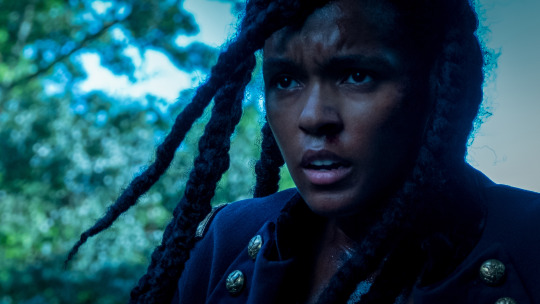
The Pantomimes of Racism.
Aaron Yap surveys the cinema landscape of slavery narratives, from The Birth of a Nation to Roots to Sankofa to Us, as he talks to writer-director duo Gerard Bush and Christopher Renz about their new addition to the catalog, Antebellum.
“It was important to us that we not serve as co-conspirators to further erasure of American history and not white-wash the past.” —Gerard Bush
Given its deep-seated psychic baggage as America’s original sin, slavery remains among the most contentious of subject matters to be portrayed in film. Widely embraced depictions are rare, while the notoriety of those tactless, or simply racist, offenders generally looms large in conversation.
Lest we forget, cinema itself was birthed in a vat of virulent racism. A monumental accomplishment like DW Griffith’s groundbreaking The Birth of a Nation (1915) was also a monument to the Ku Klux Klan. Likewise, Victor Fleming’s highly regarded Civil War-era romance Gone with the Wind (1939) presents the viewer with a problematic dichotomy: it’s an extraordinary feat of filmmaking, deeply—even perversely—intoxicating, but all its extravagant, impassioned melodrama cannot wash away the odious stain of its Black caricatures and pro-Confederacy cheerleading.
At the extreme end of this spectrum lurks the stomach-churning shockumentary tactics of Gualtiero Jacopetti and Franco Prosperi’s Goodbye Uncle Tom (1971). So deliberately pornographic in its attempts to upset and shock under the guise of educational, telling-it-like-it-is accuracy, this mondo opus might be the least easily recommendable movie ever—a film that once prompted Pauline Kael to deem it “the most specific and rabid incitement to race war.”
When citing respectable dramatizations of slavery, the Emmy-winning miniseries adaptation of Alex Haley’s sprawling bestseller Roots (1977) is still considered a benchmark. Without sacrificing the horrific authenticity of the experience, it was captivating, commercial television, but most crucially, a long-overdue corrective, centering African-Americans in a screen telling of their history. Also notable, both for its Black-centered storytelling and the ultra-independence of its 1983 release, is the little-seen Sankofa by Ethiopian filmmaker Haile Gerima—a member of the LA Rebellion (and father of Merawi Gerima, whose debut Residue has just landed on Netflix). Sankofa transports a contemporary African-American fashion model back in time to a slave plantation; it’s both a reckoning and an awakening, in honor of the “stolen spirits of Africa”.
Yet “white savior” narratives are prevalent to this day, whether it’s the well-meaning, virtuous legal theater of Steven Spielberg’s Amistad (1997) or the blaxploitation-tinged revisionist fantasia of Quentin Tarantino’s Django Unchained (2012). Even Steve McQueen’s much-lauded adaptation of abolitionist Solomon Northup’s memoir 12 Years a Slave (2013) isn’t completely untethered from the assistance of a white hand.
Perhaps something thornier like Richard Fleischer’s Mandingo (1975), frequently written off as a lurid, trashy potboiler imagining of the slave trade, deserves more than a cursory look for the way it removes clearly delineated archetypes of heroes and villains, and cathartic beats of obstacle and triumph, from the slave narrative. It exposes the poisoned capitalist pathology that produces the system—observing how souls, constantly besieged by hubris, greed and frail egos, self-implode as the unchecked power that comes with the commodification of human bodies grows.
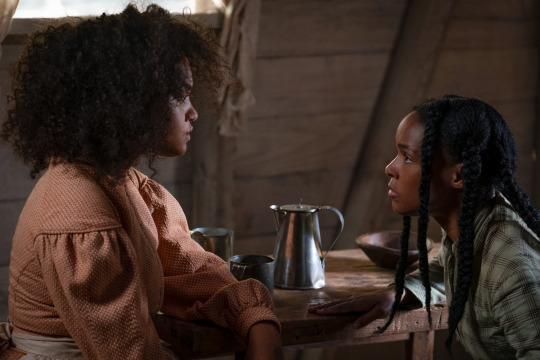
Kiersey Clemons and Janelle Monáe in ‘Antebellum’.
Now available digitally after its theatrical release was abandoned due to Covid, Gerard Bush and Christopher Rez’s Antebellum contributes another complicated, fascinating wrinkle to the nuances of slavery cinema. The film arrives at a particularly volatile time, with additional resonance provided by the on-going, extremely topical plight of inequity faced by Black Americans.
Employing the malleable, high-concept language of genre to connect the sins of the past with the present—imagine something in the vicinity of Blumhouse doing Octavia E. Butler’s Kindred, or rebooting Sankofa for that matter—Antebellum is of a piece with the gathering momentum behind the popularity of recent Black-centered genre fare, from Jordan Peele’s horror outings Get Out (2017) and Us (2019) to recent HBO shows like Watchmen and Lovecraft Country. The temporal tricksiness of the film’s narrative structure means spoiler-free synopsizing is a fool’s errand, but “it’s not a traditional horror”, Renz says, proffering “a thriller with horror elements” to describe it.
What is clear from the get-go is that something’s a little off, and the film potentially has one foot in The Twilight Zone. Opening with a quote from William Faulkner’s Requiem for a Nun (“The past is never dead. It’s not even past”), Bush and Renz, who shared writing and directing duties, waste no time thrusting us—via a visually stunning five-minute one-take tracking shot—onto an impossibly beautiful Louisiana plantation where we’re introduced to Eden, the first of two roles played by Janelle Monáe, a slave whose plans to escape are brutally thwarted by Confederate officers.
The filmmakers maintained vigilance in their recreation of trauma and the slave experience. “It was important to us that we not serve as co-conspirators to further erasure of American history and not white-wash the past,” says Bush. “But it was always of equal importance that we not engage in gratuitous violence. It was all for a meaning and purpose. So much of it is off-screen—we don’t have any physical whipping or anyone at the whipping post or any of that. This is to inform and educate and move the story forward. It’s not meant to serve as some sort of entertainment for violence sake.”
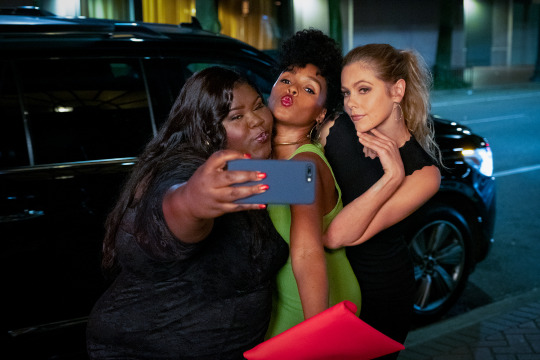
Gabourey Sidibe, Janelle Monáe and Lily Cowles in ‘Antebellum’.
Similarly, Bush says they were deliberate in their approach to using racial epithets of its time. The N-word is conspicuously absent for a film set in the Antebellum South. “It gives the audience an off-ramp to say, ‘That’s not language I would use so that’s not me, so I don’t have to engage in this and I don’t have to confront it’. These are the pantomimes of racism. The N-word and those words—they’re meant to dehumanize but just because you’re not hearing the word in the public square anymore—because it is no longer socially appropriate—doesn’t mean that all of the brutality and inequity that the word, the avatar, represented doesn’t exist anymore. It was important to us that we use the same language as Gone with the Wind in a way that they would refer to the enslaved people as the inferiors.”
In a purposefully disorienting plot shift, Antebellum moves off plantation grounds in its second act to establish Monáe’s second role, Veronica, a successful present-day academic promoting her new book Shedding the Coping Persona. Although the physical subjugation and barbarity of the past have disappeared, insidious micro-aggressions and hints remain, including the sinister presence of Jena Malone’s Southern antagonist Elizabeth, who also appears in both timelines.
For this portion, the film allows Veronica, who’s assertive, confident, free—the seeming mirror opposite of Eden—to live powerfully in her moment. Often accompanied by her bestie Dawn (a rambunctious, scene-stealing Gabourey Sidibe), these scenes foreground intersectionality, reflecting Bush and Renz’s desire to show Black women in a way that was familiar to them. “We’re surrounded by extraordinary Black women we see doing extraordinary things all the time.” Bush says. “We just don’t see it depicted on screen and we were determined that we had our opportunity, we were going to do that.”
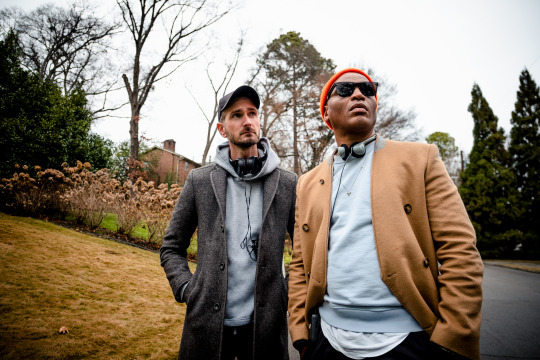
Christopher Renz and Gerard Bush on the set of ‘Antebellum’.
Stylish, visually stunning and effectively pointed, Antebellum marks a natural career progression for Bush and Renz, who began in advertising before moving into social advocacy work. “For Christopher and [me], that competitive side from advertising is what lent itself so beautifully to our waking up one day and saying we didn’t want to sell champagne for the rest of our lives, but that we needed to tell stories that mattered, especially after Trayvon was murdered.”
“Once we decided to make movies it was because we didn’t see anything in the marketplace that looked like us. I don’t think that with the finite amount of time that we have in our lives, from when we’re born to when we transition and exit out of this place, that you want to waste it committing your life to something you don’t think you can be the best at that—that you can make meaningful contribution.”
Related content
Adam Davie’s Black Life in Film list
Letterboxd member Anjelica Jade’s review of Antebellum for Vulture
Haile Gerima’s 2019 TIFF Talk about Sankofa and independent filmmaking
Cece’s list of lighthearted movies with Black characters in them because we deserve movies that aren’t about slavery, racism, police brutality and the like
Follow Aaron on Letterboxd
#antebellum#janelle monae#christopher renz#gerard bush#bush and renz#sankofa#haile gerima#get out#jordan peele#letterboxd
11 notes
·
View notes
Photo










Antebellum (USA, 2020)
#Antebellum#thriller#Janelle Monae#Jack Huston#Jena Malone#Gerard Bush#Christopher Renz#filmedit#my gifs#movie gifs
193 notes
·
View notes
Text



Source
#antebellum#bush benz#janelle monae#gerard bush#christopher renz#us#get out#horror thriller#amplifymelanatedvoices#black lives matter#blm movement#black cinema#black history month#black horror#poster art#movie posters#alternate movie posters#jordan peele
8 notes
·
View notes
Photo

Antebellum (2020)
50 notes
·
View notes
Photo

Antebellum will be released on 4K Ultra HD, Blu-ray, and DVD on November 3 via Lionsgate. The 2020 horror film is currently available on VOD.
Janelle Monáe, Eric Lange, Jena Malone, Jack Huston, Kiersey Clemons, and Gabourey Sidibe star. Gerard Bush and Christopher Renz write and direct in their feature debut. Sean McKittrick (Get Out, Donnie Darko) produces.
Special features are listed below, along with the trailer and synopsis.
Special features:
The History in Front of Us: Deconstructing Antebellum
A Hint of Horror: The Clues of Antebellum
Deleted scenes
youtube
Successful author Veronica Henley (Janelle Monáe) is finishing a book tour before she returns home to her husband and daughter. But a shocking turn of events is about to upend Veronica’s existence, plunging her into a horrifying reality that forces her to confront her past, present, and future — before it’s too late.
#antebellum#janelle monae#jena malone#eric lange#jack huston#kiersey clemons#gabourey sidibe#lionsgate#dvd#gift#horror#get out#gerard bush#christopher renz#modern horror
33 notes
·
View notes
Photo

Antebellum (2020)
#2020s#actor janelle monae#dir gerard bush#dir christopher renz#dp pedro luque#cat horror#cat mystery#cat thriller#american#red#black#bokeh#teeth#lipstick#tongue#brown eyes#earrings#ear#antebellum 2020#antebellum
2 notes
·
View notes
Video
youtube
Antebellum Final Trailer
Lionsgate’s Antebellum is forgoing a theatrical release and will instead hit video on demand on September 18, 2020.
Successful author Veronica Henley (Janelle Monáe) is “chosen” and finds herself “trapped in a horrifying reality and must uncover the mind-bending mystery before it’s too late.” (Lionsgate)
Antebellum stars Janelle Monáe, Marque Richardson II, Eric Lange, Jack Huston, Kiersey Clemons, Tongayi Chirisa, Gabourey Sidibe, Rob Aramayo, Lily Cowles, and Jena Malone. The film is written and directed by Gerard Bush and Christopher Renz.
#antebellum#antebellum movie#janelle monae#marque richardson ii#eric lange#jack huston#kiersey clemons#tongayi chirisa#gabourey sidibe#rob aramayo#lily cowles#jena malone#gerard bush#christopher renz#lionsgate#TGCLiz
22 notes
·
View notes
Text

Antebellum
Horror Movie Mini-Review: Movie 5 of ??
IMDB Summary: Successful author Veronica Henley finds herself trapped in a horrifying reality and must uncover the mind-bending mystery before it's too late.
Nonsensical Thoughts:
When this trailer was released it gave off Octavia Butler vibes and I was pumped. And wrong.
This is an ambitious concept overall, but bland execution. The cinematography, set and costume design were gorgeous. The dialogue and script had some cringe choices... Janelle Monet was incredible with what she was given to work with.
I really wanted to like this, because they definitely were trying to hold a mirror to a society that is really yearning for the “good old days”. But, it was on the nose in the worst way and seemed disinterested in its own message, placing more care in visuals. Which, honestly did look good.
#antebellum#janelle monae#kiersey clemons#Gerard Bush#Christopher Renz#tongayi chirisa#Eric Lange#Jena Malone#Gabourey Sidibe#movie reviews#film reviews#review#film#my writing#filmblr
5 notes
·
View notes